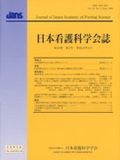Japanese
English
- 販売していません
- Abstract 文献概要
- 参考文献 Reference
- サイト内被引用 Cited by
要旨
目的:術後1年までの乳がん体験者の上肢機能障害に対する主観的認知(SPOFIA)とQOLの関連を明らかにすることである.
方法:乳がん体験者150名(平均年齢50.7歳)を対象とし,自記式質問紙調査を実施した.
結果:対象者の85.3%がSPOFIA尺度1項目以上を認知し,「腕をあげた時に腕の皮膚がつっぱる感じがする」,「触っても感じ方が鈍い部分がある」,「腕を動かすと痛い」の順に多かった.SPOFIA尺度14項目とQOLは「低い」から「かなり」の有意な負の相関がみられ(rs=-.20~-.48;p<.001~.05),特に日常役割機能(身体)および体の痛みとの相関が強かった.SPOFIAあり群はSPOFIAなし群と比較して,身体機能(p<.001),日常役割機能(身体)(p<.001),体の痛み(p<.001),活力(p<.01),社会生活機能(p<.05),日常役割機能(精神)(p<.01)が有意に低かった.
結論:乳がん体験者の術後上肢機能障害に対する主観的認知は,治療との関連をはじめとして壮年期女性の生活と密接に関連していることを示唆した.また,上肢機能障害とQOLとの関連の強さは,少なくとも術後1年の乳がん体験者が認知する上肢機能障害への予防改善に向けた支援の必要性を示唆した.
Abstract
The purpose of this study was to assess how breast cancer survivors currently subjectively perception post-operative functional impairment of the arm (SPOFIA) and to investigate the association of this impairment with QOL, focusing particularly on the first postoperative year.
The study was carried out with 150 female outpatients who were survivors of breast cancer and who had an average age of 50.7 years, and using a self-administered questionnaire. 85.3% of the subjects were aware of at least one item on the SPOFIA scale.
The highest score was for “pulling feeling of the arm skin when lifting the arm,”followed by “partial numbness when touching,”and “pain when moving the arm.”Regarding the correlation between SPOFIA score and QOL, there was a highly or a small significant negative correlation between 14 SPOFIA items and QOL (rs=-.20~-.48;p<.001~.05). Specifically, the correlation observed between SPOFIA score and role physical and bodily pain suggested that employment and social activities were more disturbed by physical state and bodily pain in individuals with higher SPOFIA score. QOL scores for physical functioning (p<.001), role physical (p<.001), bodily pain (p<.001), vitality (p<.01), social functioning (p<.05), and role emotional (p<.01)were significantly lower in those who noted SPOFIA symptoms than in those who did not.
Our study demonstrated that, in addition to treatment-related factors as reported previously, for breast cancer survivors within the first post-operative year, the subjective perception of post-operative functional impairment of the arm is closely associated with lifestyle factors experienced by normal middle-aged women of working age. This study demonstrated a strong correlation between post-operative functional impairment of the arm and QOL. Hence, professional intervention aimed at improving function in the arm should be provided, at least for one year after the operation.
Copyright © 2008, Japan Academy of Nursing Science. All rights reserved.


